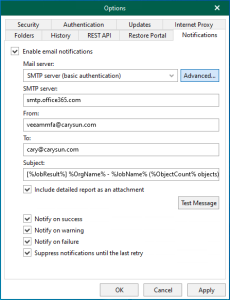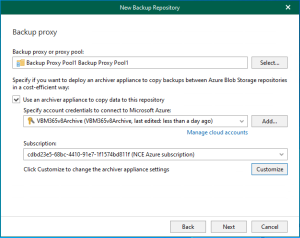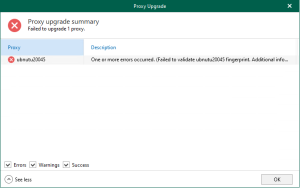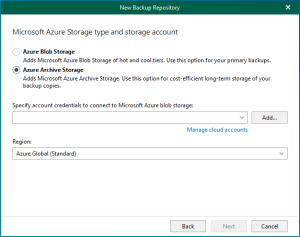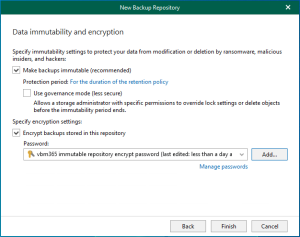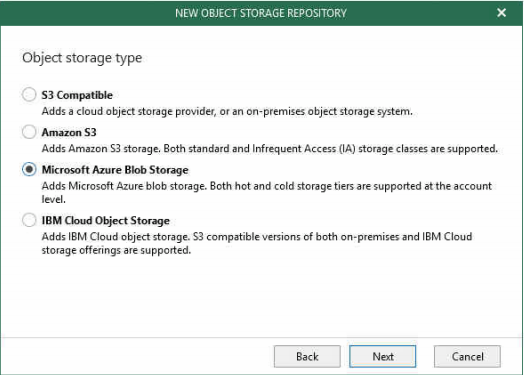
Staring from Veeam Backup for Microsoft Office 365 V4, you will be able to leverage Object Storage to offload your Office 365 data. You can choose from different providers such as Amazon S3, Microsoft Azure Blob, IBM Cloud or S3 compatible object storage providers or even on-premises object storage.
Today, I am going to show you how to use Veeam Backup for Microsoft Office 365 V4 backup to Azure Blob. If you still don’t know how to create Azure Blob, you can reference my previously post as follow link to created it.
- Login to Veeam server.
-
Open Veeam Backup for Microsoft Office 365 connect to…. Console.

-
On the User Account Control page, click Yes.

-
Click Connect on the Veeam Backup for Microsoft Office 365 console connect page.

-
On the Veeam Backup for Microsoft Office 365 home page, select BACKUP INFRASTRUCTURE.

-
On the BACKUP INFRASTRUCTURE page, select Object Storage Repositories.

-
Right-click Object Storage Repositories, select Add object storage…

-
On the New Object storage repository page, type Azure Blob as Object storage repository name, click Next.

-
On the new Object storage type page, select Microsoft Azure Blob Storage, click Next.

-
On the Microsoft Azure storage Account page, click Add on Specify account credentials to connect to Microsoft blob storage item.

-
Paste Azure storage account name as Account and paste key1 as Shared key (you created copied them from Azure storage account Access key), click OK.

-
On the Microsoft Azure storage Account page, select Azure Global (Standard) as Region, click Next.

-
On the Microsoft Azure Blob container page, select an Azure Blob container (you created it previously when you create Azure Storage Account and settings), click Browse on Folder.

-
On the Select the folder page, click New Folder.

-
Type Office365Backup as the new folder name, click OK.

-
On the Microsoft Azure Blob container page, click Advanced.

-
On the ADVANCED SETTINGS page, if you would like to control the storage spend, select Limit object storage consumption and put the storage size for it, click OK.

-
On the Microsoft Azure Blob container page, click Finish.

-
Now, you will see the new Repository on the Object Storage Repositories page.

-
Select Backup Repositories, right-click Backup Repositories and select Add backup repository…

-
On the Specify details for backup repository page, type Azure Blob-Office365 as repository Name, click Next.

-
On the Specify location for backup repository page, select your Backup proxy server and click Browse for Path.

-
Select the folder as path and then click OK.

-
On the Specify location for backup repository page, click Next.

-
On the Specify if you want to extend your backup repository to object storage page, select offload backup data to object storage and select AZURE BLOB (you just created it).

-
Select Encrypt data uploaded to object storage, click Add for Password.

-
Enter Password and click OK.

-
Click Next on the Object storage backup repository page.

-
On the Specify retention policy settings page, I am going to keep the default settings and then click Finish.

-
Make sure you successful create the new repository.

-
It’s time to create a new backup job for offload to Azure Blob, select ORGANIZATIONS, right-click your organization and select Add to backup job…

-
On the Specify job name and description page, enter name for your backup job. Click Next.

-
On the Select objects to back up page, select Back up entire organization if you have enough users license for entire organization, if not, you need to select Back up the following objects. You can add by users, groups, sites and Organization. Click Next after you add them.

-
On the select objects to exclude page, you can add by users, groups, sites and Organization. Click Next after you add them.

-
On the Specify backup proxy and repository page, select backup proxy and Azure Blob repository and then click Next.

-
On the Select scheduling options page, enter your schedule information and click Create.

Hope you enjoy this post.
Cary Sun
Twitter: @SifuSun
Author: Cary Sun
Cary Sun has a wealth of knowledge and expertise in data center and deployment solutions. As a Principal Consultant, he likely works closely with clients to help them design, implement, and manage their data center infrastructure and deployment strategies.
With his background in data center solutions, Cary Sun may have experience in server and storage virtualization, network design and optimization, backup and disaster recovery planning, and security and compliance management. He holds CISCO CERTIFIED INTERNETWORK EXPERT (CCIE No.4531) from 1999. Cary is also a Microsoft Most Valuable Professional (MVP), Microsoft Azure MVP, Veeam Vanguard and Cisco Champion. He is a published author with several titles, including blogs on Checkyourlogs.net, and the author of many books.
Cary is a very active blogger at checkyourlogs.net and is permanently available online for questions from the community. His passion for technology is contagious, improving everyone around him at what they do.
Blog site: https://www.checkyourlogs.net
Web site: https://carysun.com
Blog site: https://gooddealmart.com
Twitter: @SifuSun
in: https://www.linkedin.com/in/sifusun/
Amazon Author: https://Amazon.com/author/carysun
